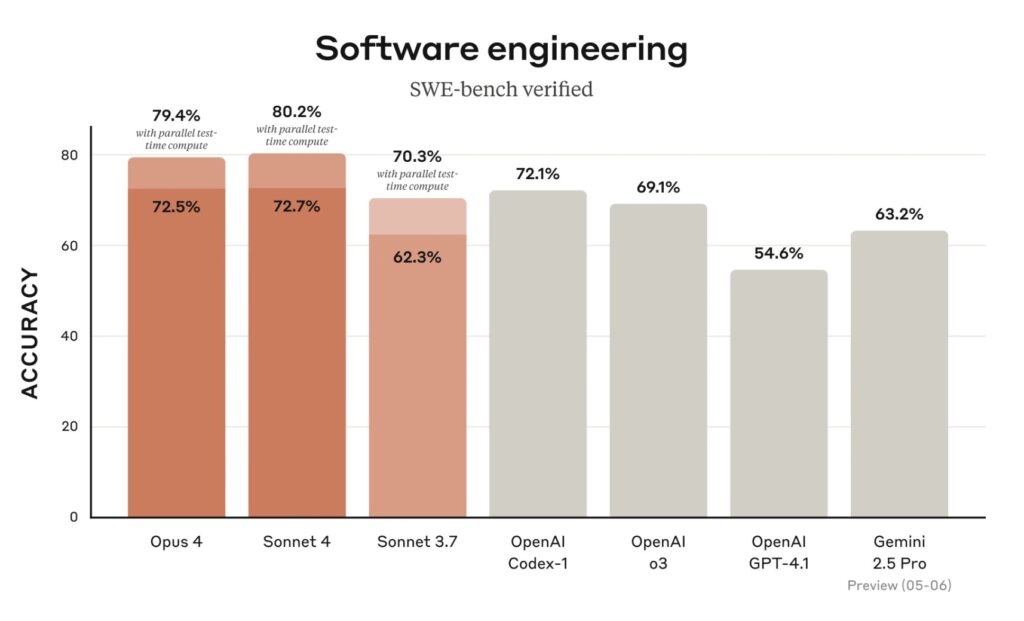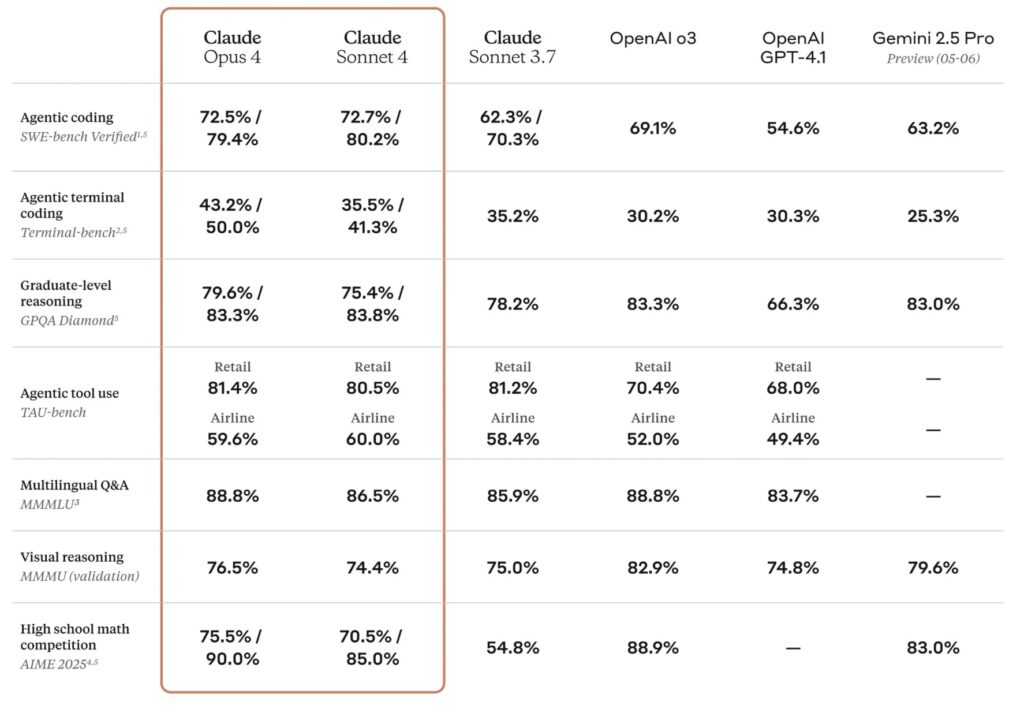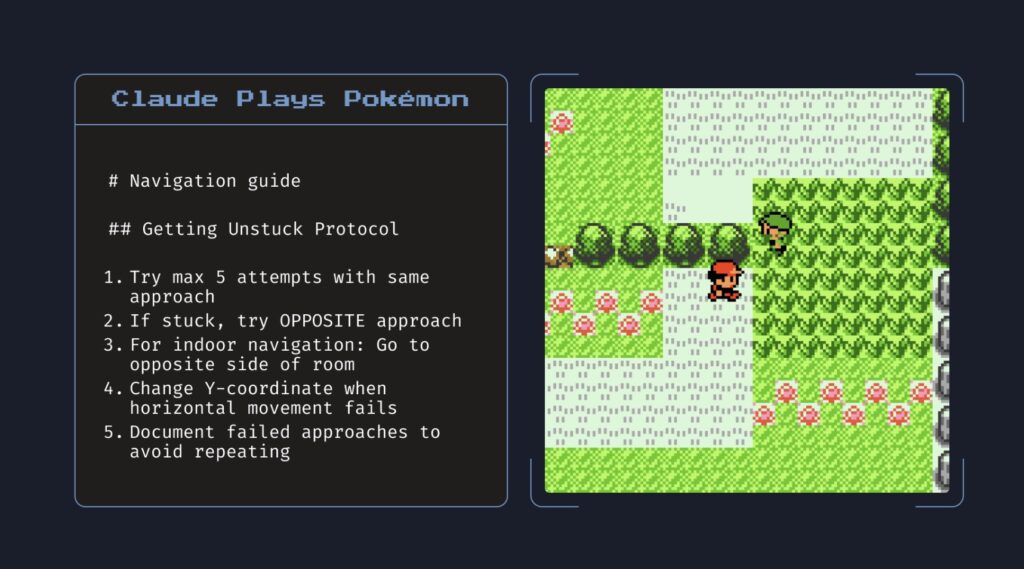Anthropic’s groundbreaking Opus 4 and Sonnet 4 models redefine coding, reasoning, and AI agent capabilities, empowering developers and users alike.
- Unprecedented Performance: Claude 4, featuring the flagship Opus 4 and the versatile Sonnet 4, delivers world-leading coding abilities and advanced reasoning. Opus 4, in particular, stands out for its sustained performance on complex, long-duration tasks, setting a new global standard.
- Enhanced Intelligence & Integration: These new models boast significantly improved capabilities, including extended thinking through dynamic tool use (like web search), the ability to execute tools in parallel, superior memory retention for continuity, and more precise adherence to instructions. This is further augmented by powerful new API functionalities designed for building sophisticated AI agents.
- Developer-Centric Advancements: Recognizing the crucial role of developers, Claude Code is now generally available. This includes direct integrations with popular IDEs such as VS Code and JetBrains, alongside a new SDK, fundamentally transforming the developer workflow and enabling the creation of custom, powerful AI agents.

Anthropic has officially introduced the next generation of its Claude AI models: Claude Opus 4 and Claude Sonnet 4. This launch marks a significant milestone, pushing the boundaries of what’s possible in coding, advanced reasoning, and the development of sophisticated AI agents. These models are not just incremental updates; they represent a leap forward, designed to tackle more complex challenges and integrate more seamlessly into diverse workflows.
Claude Opus 4: The New Gold Standard in Coding and Complex Reasoning
Claude Opus 4 emerges as Anthropic’s most powerful model to date and is positioned as the world’s leading coding model. It demonstrates exceptional performance on demanding benchmarks like SWE-bench (achieving 72.5%) and Terminal-bench (43.2%). What truly sets Opus 4 apart is its capacity for sustained performance on intricate, long-running tasks that can span thousands of steps and require continuous operation for several hours. This dramatically expands the potential of AI agents, allowing them to handle projects previously beyond their reach.
Industry leaders are already recognizing Opus 4’s prowess. Cursor calls it “state-of-the-art for coding” and a “leap forward in complex codebase understanding.” Replit has observed “improved precision and dramatic advancements for complex changes across multiple files.” Block notes that Opus 4 is the “first model to boost code quality during editing and debugging” in its agent, codenamed goose, all while maintaining full performance and reliability. Rakuten validated its capabilities through a demanding open-source refactor that ran independently for seven hours with sustained performance. Cognition AI highlights Opus 4’s ability to solve complex challenges that other models falter on, successfully handling critical actions previously missed.

Claude Sonnet 4: Power and Practicality Combined
Claude Sonnet 4 represents a substantial upgrade from its predecessor, Sonnet 3.7, offering superior coding and reasoning capabilities while responding with greater precision to user instructions. It also achieves a state-of-the-art 72.7% on the SWE-bench for coding. Sonnet 4 is engineered to strike an optimal balance between high performance and efficiency, making it suitable for a wide array of internal and external use cases. Its enhanced steerability gives users greater control over implementations, providing an excellent mix of capability and practicality, even if it doesn’t match Opus 4 across all domains.
The industry feedback for Sonnet 4 is equally compelling. GitHub states that it “soars in agentic scenarios” and will integrate it as the model powering the new coding agent in GitHub Copilot. Manus praises its “improvements in following complex instructions, clear reasoning, and aesthetic outputs.” iGent reports that Sonnet 4 excels at “autonomous multi-feature app development” and shows “substantially improved problem-solving and codebase navigation,” reducing navigation errors from 20% to near zero. Sourcegraph sees the model as a “substantial leap in software development,” noting its ability to stay on track longer and provide more elegant code. Augment Code reports “higher success rates, more surgical code edits, and more careful work through complex tasks,” making it their top choice for their primary model.

Groundbreaking Model Capabilities
Both Opus 4 and Sonnet 4 introduce a suite of new capabilities. A key innovation is “extended thinking with tool use” (currently in beta), allowing the models to dynamically use tools like web search. This enables Claude to alternate between reasoning and tool utilization, significantly improving the quality and relevance of its responses. Furthermore, the models can now use tools in parallel, enhancing efficiency.
A critical advancement is their improved memory. When developers grant access to local files, these models demonstrate significantly enhanced memory capabilities, extracting and saving key facts to maintain continuity and build tacit knowledge over time. Opus 4, for instance, can create and maintain ‘memory files’ to store crucial information, leading to better long-term task awareness and coherence, exemplified by its ability to create a ‘Navigation Guide’ while playing Pokémon.
Anthropic has also worked to reduce instances where models might take shortcuts or exploit loopholes to complete tasks, with both new models being 65% less likely to engage in such behavior compared to Sonnet 3.7 on susceptible agentic tasks. For lengthy thought processes, “thinking summaries” are introduced, where a smaller model condenses the reasoning. This is only necessary about 5% of the time, as most thought processes are concise enough to be displayed fully. For users needing raw chains of thought for advanced prompt engineering, a new Developer Mode is available via sales.
Claude Code: Revolutionizing Developer Workflows
Claude Code, now generally available, extends Claude’s power directly into the developer’s workflow. New beta extensions for VS Code and JetBrains integrate Claude Code into these popular IDEs, allowing proposed edits to appear inline within files. This streamlines the review and tracking process within a familiar environment. Installation is as simple as running Claude Code in the IDE terminal.
Beyond IDE integration, Anthropic is releasing an extensible Claude Code SDK, empowering developers to build their own custom agents and applications using the same core agent that powers Claude Code. An example of this SDK’s potential is “Claude Code on GitHub” (now in beta), which can be tagged on pull requests to respond to reviewer feedback, fix CI errors, or modify code.
New API Capabilities and Accessibility
To further empower developers building AI agents, Anthropic is releasing four new capabilities on its API: a code execution tool, an MCP (Model-Chosen Parameters) connector, a Files API, and the ability to cache prompts for up to one hour.
Claude Opus 4 and Sonnet 4 are designed as hybrid models, offering both near-instant responses for quick tasks and an “extended thinking” mode for deeper reasoning. These models, along with extended thinking, are included in the Pro, Max, Team, and Enterprise Claude plans. Sonnet 4 is also available to free users. Both models are accessible via the Anthropic API, Amazon Bedrock, and Google Cloud’s Vertex AI. Encouragingly, pricing remains consistent with previous Opus and Sonnet models: Opus 4 at $15/$75 per million input/output tokens, and Sonnet 4 at $3/$15 per million input/output tokens.
Towards a Future of Collaborative AI
These advancements represent a significant step towards creating a true virtual collaborator—an AI that can maintain full context, sustain focus on longer projects, and drive transformational impact. Anthropic emphasizes that these models come with extensive testing and evaluation to minimize risk and maximize safety, including the implementation of measures for higher AI Safety Levels, such as ASL-3.
The introduction of Claude Opus 4 and Sonnet 4, along with the enhanced Claude Code and new API features, signals an exciting phase in AI development. Users and developers are encouraged to explore these new capabilities and discover the innovative solutions they can build.
